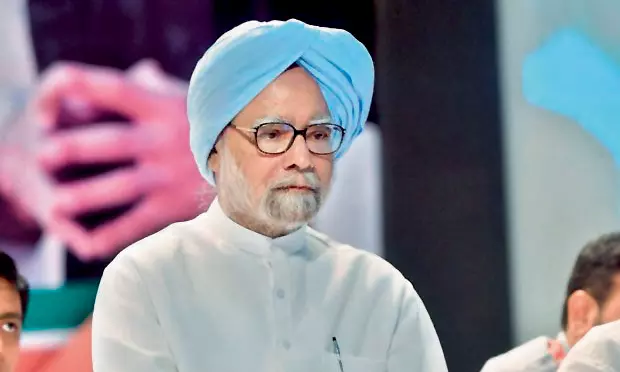Saeed Naqvi | Manmohan gave us decency in politics; Indira ‘sterilised’ dissent in Cabinet

The spontaneous outpouring after Dr Manmohan Singh’s death reflects on the widespread yearning for the decency we have lost in public life. I remember with affection the occasion when he turned up at the Habitat Centre for the screening of some short films on composite culture: Abdul Rahim Khanekhana’s Sanskrit verse on Lord Ram, Hasrat Mohani’s adoration for Krishna committed to verse in Urdu, Awadhi and Braj Bhasa; Munshi Chunnilal Dilgir’s pre-Anis Marsias on the tragedy of Karbala, and so on.
He waited for the audience to thin, then waved. “What a beautiful country we are spoiling.” He surprised me by repeating a couplet with which every episode in the series opened: “Uske farogh e husn se jhumke hai sub mein noor/Sham e haram ho ya ki diya Somnath ka” (His light permeates all; The lamp in Kaaba; the diya at Somnath.)
“That’s Mir Taqi Mir”, I said.
“I read poets other than Iqbal also”, he laughed.
UPA-2: Third power centre
Manmohan Singh's second term, starting 2009, was something of a surprise to him. Before the results, the PM had begun to advise confidantes to seek other pastures. But the rise in seats from 145 in 2004 to 206 in 2009 was attributed to a certain “youth surge”. This boosted Rahul Gandhi’s standing, but also created problems for the party managers. The bipolarity at the top, the Congress president and PMO, was already worrying pundits. Was Rahul likely to be the third power centre?
Biting his fingernails, Ahmad Patel would talk of Rahul like he had seen an apparition. A suggestion gained currency that Rahul be absorbed in the Union Cabinet. It would be just the sort of apprenticeship that would equip Rahul for a bigger stage being planned for him.
Handling critics, Indira style
The Emergency-era Congress president, Dev Kant Barooah, once invited Rishi Kumar Mishra, editor of Patriot, for a hush-hush conversation on his lawn where there was no fear of the exchange being bugged. Furtively a crumpled piece of paper, with the names of three Congress leaders scribbled on it, was handed to Mishra. Indira Gandhi wanted Mishra to find out with some urgency their ideological antecedents, specifically “how close were they to the Americans”. Mishra’s self-esteem, boosted by such faith in his resourcefulness by the country’s most powerful leader, spurred him into action! As he dug deep into his “top secret” assignment and found himself nearing the end of the tunnel, he got a high-voltage shock one morning. The three names on the crumpled piece of paper adorned Page 1 headlines in the newspapers. The three had been inducted into the Union Cabinet.
A cheated Mishra turned up at Barooah’s office seething with rage. Anticipating the storm that was about to break, threatening the glass-top table, Barooah held him by the hand and shared with Mishra his most succinct interpretation of the apparent double-cross.
For Indira Gandhi, he explained, “one way to monitor possible dissidents in the party was to sterilise them by inducting them into the Cabinet system”.
The storm over Soros
The excitement about Hungarian-American billionaire George Soros trying to do in India what the US does elsewhere -- bring about regime change -- takes my mind back to Donald Trump’s first term, 2016 to 2020. A huge influence in the White House in Trump’s earlier months, Steve Bannon, spent months, after giving up his White House job, across Western democracies identifying right-wing leaders like Marine Le Pen (France), Nigel Farage (UK) or Jair Bolsonaro (Brazil), who would easily fit into the category of “fascist” for some future global coalition. Around that time George Soros, the other capitalist ideologue, was searching for “liberals” like a needle in a haystack.
One Soros story is set in the Bosnian war 1992-96. During this calamitous war was played out the siege of Sarajevo, Bosnia’s capital, a year longer than the siege of Leningrad and the longest siege of any capital city.
A story of brave journalism that must be celebrated, every year if possible, concerns Sarajevo’s oldest newspaper, Oslobojema. How did the journalists of this newspaper manage to produce the daily regularly, without fail, for the 1,440 days that the siege lasted and during which over 15,000 people were killed?
When asked for the address of Oslobojema, people in Sarajevo pointed their finger in one direction. We scanned the horizon without being able to see any building.
There was no building to be found, only a huge heap of debris. This must have been a multi-storied structure. From beneath the debris light shimmered like lamps in a graveyard. It was a trek, not a walk, through broken brackets and slanted slabs of cement and concrete. I was able to recognise the editor, Kemal Kurspahic, from our meeting at the NAM summit in Belgrade in 1989, a year before Yugoslavia broke up, leading to the Bosnian war of which the siege of Sarajevo was the crowning tragedy.
Kemal was no longer a lively, gregarious journalist, strong of elbow, knocking back improbable rounds of schnapps. Now he had a mark on his forehead which devout Muslims develop as proof of multiple sajdas, or the act of placing the forehead on the ground for supplication.
“That’s a huge change”, I said, pointing to his forehead.
“That’s what happens when the world abandons you,” he said.
Despite unbelievable odds in the midst of a raging war, it was almost miraculous that Oslobojema hit the stalls on a daily basis. Above all, such an enterprise required a steady source of finance. Who financed this paper for Bosnia’s predominantly Muslim population? “You really want to know?” Kemal asked, looking at me severely.
“George Soros”.

